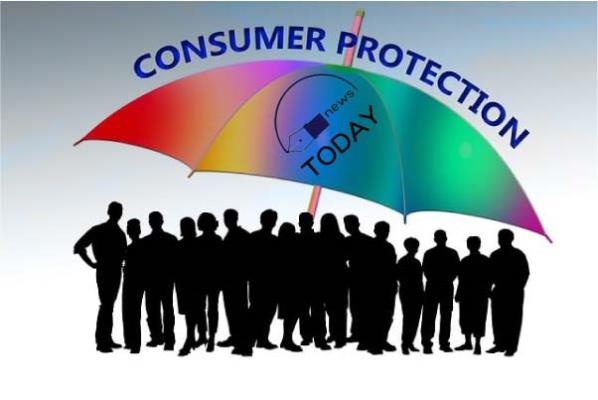Why Needs to Consumer Protection? Problems Faced by Consumers
Right to Information, Right to Safety, Right to Choose, Right to be Heard, Right to Redress, Right to Consumer Education and Right to Healthy Environment.

The necessity of adopting measures to protect the interest of consumers arises mainly due to their helpless position and the unfair business practices. So, consumers needs to protection.
Why Needs Consumer Protection?
No doubt consumers have the basic right to be protected from the loss or injury caused on account of defective goods and deficiency of services.
However, consumers are unable to make use of their rights due to lack of awareness and ignorance. For example, as consumers we have the right to choose the goods of right quality from a variety of similar goods available in the market. But often we fail to make the right choice because of misleading advertisements by which we are carried away and buy sub-standard goods.
• Under certain circumstances, we are helpless in the sense of our inability to verify the quality of products. The clever shopkeeper can deceive us by his persuasive words. If the date of expiry on a strip of medicinal tablets is not legible, we may be in a hurry and depend on what the seller tells us. If the medicine does not have the desired effect, we may go to the doctor again and request him to prescribe some other medicine, we forget that the medicine we bought might not have had the effect as we were supplied the medicine after its date of expiry
• Often, we are guided by some of our beliefs without any basis. For instance, many of us believe that ‘higher price indicates better quality’ and so do not mind paying higher price for a product if the salesmen recommend it to be of good quality. Again, it is a common belief that imported goods are inevitably of a superior quality. So, if there is a printed label or a mark that shows a product is made in a foreign country, we may buy it at a higher,
• Producers of goods often put standard certification marks like ISI on the package which are genuinely certified. Similarly, if packaged good are sold short of weight we pay for, it is very difficult to verify always the weights before buying. Sometimes the weighing machines are defective.
• Above all, consumers are not fully aware of remedies open to them if goods are defective or there is deficiency of service.
So, you can very well realize why steps must be taken to protect consumers from business practices which are unfair and may cause loss and injury to health and other dangerous effects.
Right to Safety
PROTECTION OF HAZARDOUS AND UNSAFE PRODUCTS AND SERVICES.
Right to Information
INFORMATION ABOUT THE QUALITY, QUANTITY, POTENCY, PURITY, STANDARD AND PRICE OF PRODUCTS AND SERVICES.
Right to Choose
AVAILABILITY OF SELECTION OF GOODS AND SERVICES FROM THEIR VARIETIES TO JUSTIFY THE QUALITY, COST, PREFERENCE.
Right to be Heard
RAISE UNHAPPINESS AGAINST CONSUMER MALPRACTICES OR RIGHT TO BE REPRESENTED BY CONSUMER ORGANIZATION.
Right to Redress
THIS IS THE CRUX OF CONSUMER RIGHTS. THE CONSUMER IS ENTITLED TO HAVE LEGAL REMEDY, EITHER MONETARY OR EXCHANGE, IN CASE OF VIOLATION OF CONSUME RIGHTS.
Right to Consumer Education
TO HAVE ACCESS TO PROGRAMS AND INFORMATION THAT HELPS THE CONSUMER TO MAKE A BETTER AND INFORMED BUYING DECISION.
Right to Healthy Environment
TO LIVE AND WORK IN AN ENVIRONMENT THAT DOES NOT AFFECT CONSUMERS’ WELFARE AND HEALTH.
Consumer Rights, Objectives, Problems, Protections by Laws & Responsibilities
In simple words, the persons who use or consume products or services are consumers. The definition of consumer right is ‘the right to have information about the quality, potency, quantity, purity, price and standard of goods or services. In addition, Right to have access information about products and services.
According to the Constitution of Bangladesh, to have access to food, clothing, education, healthcare, shelter and consumer rights are recognized in the Consumer Rights Protection Act 2009
Objectives
- Explain the meaning of consumer protection;
- State the various problem faced by consumers;
- Realize the need for consumer protection;
- Identify the parties involved in consumer protection;
- Outline the provisions of laws aimed at protecting consumers;
- Understand the jurisdiction of consumer court established for redress of consumer disputes;
Problems Faced by Consumers
Consumers may be deceived in various ways by unscrupulous businessmen including traders, dealers, producers and manufacturers as well as service providers.
Some of the following unfair practices must have come to your notice sometime or the other:
• Adulteration that is, adding something inferior to the product being sold. This is a practice we come across in the case of cereals, spices, tea leaves, edible oil, petrol, etc. For example, mustard oil may be adulterated with rape seed oil or argemone oil, black pepper is known to be adulterated with dry papaya seeds, petrol is mixed with kerosene oil, vanaspati may be mixed with ghee/butter. Sometimes, the inferior material used with the product may be injurious to health.
• Sale of spurious products that is, selling something of no value instead of the real product. This is often found in the case of medicines and drugs or health care products. Cases have been reported where ampules for injections contained only water or glucose water in bottles contained only distilled water.
• Use of false weights and measures is another malpractice which some traders adopt while selling the goods. Goods which are sold by weight (kg.) like vegetables, cereals, sugar, etc. , those sold by measures (meter) like textile fabrics, suit pieces, are sometimes found to be less than the actual weight or length. False weights (1Kg, 500 grams, 250 grams, etc) or measuring tapes or sticks having false markings are used for the purpose and buyers are cheated. Sometimes packaged goods and sealed containers (tins) contain less quantity, than what is stated on the label or packet. This cannot be easily verified. Sweets are often weighed along with the card board box which may weigh up to 50 – 100 grams. You pay for it at the same rate as the sweets.
• Sale of duplicates, that is, goods that indicates a mark which shown it is of superior quality than what it actually is. For example, goods which are locally made are sold at a higher price as imported items expected to be of superior quality. Certain products like washing soap, detergent powders, tube lights, jams, edible oil, even medicines, carry well-known brand names although these are made by others.
• Hoarding and black-marketing is another problem that consumer often faces. When any essential commodity is not made available in the open market and stocks are intentionally held back by dealers it is known as hoarding. Its purpose is to create an artificial scarcity, to push up the prices. Black marketing is the practice of selling hoarded goods, secretly at a higher price. These practices are sometimes adopted when there is short supply of any product. You may have read in the newspapers sometime back about scarcity of onions in the open market in some states and high prices being charged by traders who had stocks.
• Tie-in-Sales Buyers of durable consumer goods are sometimes required to buy some other goods as a pre-condition to sale or may be required to pay after-sales service charges for one year in advance. You may have heard about tying up of new gas connections with the sale of gas stoves (burners). Also, TV sets are sometimes sold on the condition that the buyers will make advance payment of a year՚s service charge.
• Offering gifts having no additional value or coupons to collect a gift on the next purchase of some product are practices aimed at alluring consumers to buy a product. Often gifts are offered after the price of the product on sale has been increased. Dealers also announce contests or lottery among buyers of a product without the intention of awarding any prize.
• Misleading advertisement is yet another practice by which consumers are deceived. Such advertisements falsely represent a product or service to be of superior quality, grade or standard, or falsely assert the need for or usefulness of a product or service. A pharmaceutical company advertised that use of its paracetamol tablet did not have any side effects like aspirin, but it suppressed the experts ′ report that the use of paracetamol had adverse effect on the liver. A company announced in its advertisement that it was manufacturing 150 cc. scooters in technical collaboration with a foreign company, although no such collaboration had been entered into. In another case, a company used the trademark of a well-known company ′ Philips ′ in its advertisement for TV sets; on enquiry it was found that the company did not have the necessary permission from Philips for the use of its trade mark on TV sets. It was a case of misrepresentation of facts although that company was authorized to use the trademark ′ Philips ′ on its audio products (radio sets) only
• Sale of sub-standard goods i.e. sale of goods which do not conform to prescribed quality standard particularly for safety. Such products include pressure cookers, stoves, electric gadgets (heaters, toasters, etc.) , and cooking gas cylinders.
Example (1) — Change of mind, so no refund
Mrs. Kathleen buys a jacket from a shop. When she got home, she decided she didn’t really like it. She went back to the shop the next day to ask for a refund. The shop assistant refused, saying that their returns policy stated they did not refund for change of mind. Mrs. Kathleen kept the jacket.
Example (2) — Buyer has to pay postage for a return
Mr. James bought a pair of running shoes online. The website’s delivery information said he should receive the shoes in three to five days. Three weeks and several phone calls later, the shoes finally arrived.
Mr. James had become sick of waiting and bought shoes elsewhere. He returned the shoes to get a refund because of late delivery. He had to cover the cost of postage, as under the Consumer Guarantees Act, it’s the buyer’s responsibility to return an item — unless doing so is particularly difficult or expensive.
Example (3) —Free repair after poor service
Shah Rahman hired B&D Construction Sa Inc., a local tardier in NY city, to build a fence around his front garden. It wasn’t quite level in places, but she was happy enough with the job to not mention it. Several months later, a number of nails had come loose. Shah Rahman contacted B&D Construction Sa Inc. to complain about poor workmanship. B&D Construction Sa Inc. agreed the work had not been carried out with reasonable care and skill — an assistant he’d since fired had worked on those portions of the fence. B&D Construction Sa Inc. repaired the fence free of charge.
Laws Of Consumers’ Protection Act, In Bangladesh
A number of laws have been passed by the People’s Republic of Bangladesh over the years to protect the interest of consumers.
A brief outline of the purpose of these laws in given below:
- The essential Commodity Act, 1956 (Amendment) 1990
- The pure food Ordinance, 1959
- The Price and distribution of essential Commodity Ordinance, 1970
- The drug Control Ordinance, 1982 • The breast milk substitute (regulation of marketing) ordinance 1984
- The tobacco goods marketing(control) act 1988
- The special powers act 1974
- The dangerous drug act 1930
- The trade marks act 1940
- The standard weights and measures ordinance 1982
- The food grain supply ordinance 1956
- The penal code 1860
- The sale of goods act 1930
- The Bangladesh standards and testing institute ordinance 1985 (amendment) 2003
- Fish and Fish Product Rules 1997
- The Consumer Rights Protection Act, 2009
Laws Of Consumers’ Protection Act, In India
A number of laws have been passed by the Government of India over the years to protect the interest of consumers.
A brief outline of the purpose of these laws in given below:
- Agricultural Products (Grading and Marketing) Act, 1937
- Industries (Development and Regulation) Act, 1951
- Prevention of Food Adulteration Act, 1954
- Essential Commodities Act, 1955
- The Standards of Weights and Measures Act, 1956
- Monopolies and Restrictive Trade Practices Act, 1969
- Prevention of Black-Marketing and Maintenance of Essential Supplies Act, 1980
- Bureau of Indian Standards Act, 1986
- Consumer Protection Act, 1986
Consumers’ Responsibilities
- Use of product safely, following all safety instructions and remaining alert for future precautions.
- Choose vigilantly at a fair price.
- Make the effort to seek compensation for a wrong.
- Make choices that minimize the environmental impact of your purchase on others.
- Consume in a sustainable manner, so as not to prevent others from meeting their own needs.
- A consumer must exercise his/her right
- A consumer must be cautious
- A consumer must be quality-conscious
- A consumer should file complaints for the redress of genuine grievances
- A consumer must insist on a cash memo
- A consumer should not get carried away by advertisements
- A consumer should use the products safely
- A consumer must be honest
- Save Environment & Sustainability
- Form a Consumer Society like cnews TODAY
Different marks indicating quality in different products are:
ISI
This Mark Is For Consumer Durable Goods, Electronic Items, Kitchen Appliances, Etc.
AGMARK
This Mark Is For Agricultural Commodities And Livestock Products.
BIS Mark (Hallmark)
This Mark Is For Gold Jewelry
Wool Mark
This Mark Signifies 100% Pure Wool.
ECO Mark
This Mark Is For Environmental Friendly Products.
FPO Mark
This Mark Is For Food Products.
Consumers Safety
To have access to food, clothing, and education, healthcare, shelter are recognized are the first level fundamental rights. They are known as the basic necessities or primary needs.
Safety or security needs means by once the first level needs are satisfied, consumer move to the next level of safety rights. Physical safety, security, stability and protection are also recognized are the Consumer Rights
Consumers have to rights to legal help
When companies or individuals fail to meet the safety requirements set by legislation, regulation, and industry standards, they can be held liable for harm that comes to their customers, patients, and those under their care.
We firmly believe that individuals have a right to protect themselves and their family, should they encounter harmful products or unsafe conditions.
cnews TODAY provide informative, actionable resources and news related to lawsuits filed of consumers protection. We also advocate, workshop, campaign, study, case reviews so consumer can better understand their legal rights.
Build Awareness
We understand that we are still near the beginning of our journey in becoming a more diverse and inclusive organization
We pride ourselves in knowing our audience’s needs and delivering the most appropriate experience.
How to Aware Consumers?
Now, let’s dive into some of the key steps and considerations that companies can take to help grow their communities.
- Take a Customer-First Approach.
- Give People a Reason to Meet.
- Be Part of the Discussion.
- Don’t Underestimate Approachability.
- Get Together Online & Offline.
- Consider a Platform like cnews TODAY
What to do our business owner to increase customer awareness?
Our business owner play vital role to increase customer awareness such as publishes content, advertise with us, join the Consumer Community & let’s ROAR SUN, etc.
- The first step to building customer awareness is to distinguish brand or company’s offer.
- Encourage referrals and reviews.
- Map the customer journey.
- Build brand presence.
- And increase brand awareness.
Conclusion
Consumer protection is essential for safeguarding the rights and interests of individuals in the marketplace. It ensures fair practices, prevents exploitation, and promotes trust between consumers and businesses. Without adequate protection, consumers are vulnerable to deceptive advertising, unsafe products, unfair pricing, and fraudulent schemes. By establishing regulations, enforcing standards, and providing avenues for redressal, consumer protection fosters economic stability and social welfare. It empowers consumers to make informed choices, enhances market competition, and sustains a healthy economy. Ultimately, consumer protection is crucial for upholding ethical standards, preserving consumer confidence, and maintaining a balanced relationship between buyers and sellers.
References:
- Business Studies: Consumer Protection, Meaning, Objectives and Problems Faced by Consumers
- Consumers Rights Protection in Bangladesh
- Consumers Rights: Nature, Scope
- Consumer Rights: Who is consumer?
- Common Consumer Issues: Refund, Replacement, Repair
- The consumer Protection Act- Canadian Legal FAQs
- The Consumer Protection Rights, 2009
- The Australian Consumer Law
- The Bureau of Consumer Protection
- Consumer Rights: Consumer Association of Bangladesh




